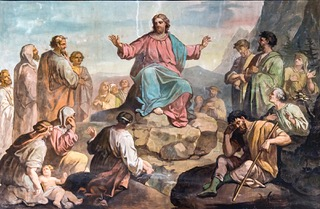Sunday Reflection with Canon Robin Gibbons: 16 February

Sermon on the Mount by Robert Arsene in church of St Martin de Castelnau dEstretefonds
Sixth Sunday in Ordinary Time
Hard though it may be for us to hear it, Jeremiah's comparison between trust in human beings and God strikes one s very prescient in an age of great confusion and mistrust in the wider political sphere often caused by the social media that has very little checks and balances. What is worse is the outright lack of probity we discover amongst so many of our public figures, I am sure you will know that kind of thing I mean, mendacity covered up as truth, dissembling instead of openness, the list goes on! There is nothing new in this, and that is why the oracle of God from Jeremiah is worth our attention, these words are important because they give us something significant to hold fast to : "Cursed is the one who trusts in human beings,
who seeks his strength in flesh,
whose heart turns away from the LORD".(Jer 17:5)
These are strong and harsh words, but if we are honest with ourselves have the merit of making us sit up and pay attention. The question we need to ask is why is this so? The answer is simplicity itself and is there in that last phrase about the heart turning away from the Lord. One could argue that there are many good people who do not have religious belief and yet lead good, honourable and truthful lives. We acknowledge that, but in this case Jeremiah is speaking to those who in the first instance claim religious affiliation and identify themselves as believers of some kind, so part of our question is; what do we understand by religion and our part in it? I don't intend to make my reflection a theological lecture, but I want to share some insights of my own and others, that though following the Christ of the Gospel might be difficult at times, it is something we have covenanted ourselves to do. Our faith gives us so many supports, it leads us if we would let it, to know the Living God, found for us as Catholics in Christ, given us by the gifts of the Spirit and lived out in our community called Church very much immersed in our world, but it also gives us tools to discern what is good and profitable for ourselves and others but, very importantly what is not healthy or good.
This ability to discern, move forwards in hope, and challenge wrongdoing and evil comes from these gifts of the Spirit and the grace and mercy of God. If at times our lives might seem torn apart, so arid that they are:
" like a barren bush in the desert
that enjoys no change of season,
but stands in a lava waste,
a salt and empty earth".(Jer 17: 6)
Any one of us who resonates with that image might also be able to say, 'but at this time I placed my faith in the Lord'. I have done this at points in my life when things had collapsed, not out of desire but almost as a last resort, and it was then, at the point of the bleakest moment, I managed to hold on and not give in to despair or anguish or whatever-it was at this point of the 'lava waste' or 'salt and empty earth' when all one can do is trust in the dark, it is then things change, another horizon seems to be present, where there once was a wall, now there is a door . When we get to these points of human life, the power of the Scriptures, particularly the Gospels and those wondrous songs and poems of our relationship with God, the psalms, provide us with a rich resource, nourishment that enters into our mind and soul. One of the great teachings of Jesus, which forms part of the fabric of our faith and relationship with Him, comes in the form of the Beatitudes, the blessings, which is not necessarily the right translation, so perhaps we need to think more in terms of Jesus saying to us: 'Happy or fortunate are you"
The Gospel of Luke not only has the blessings, but also a corollary, the set of warnings. Why does Jesus focus on the poor, the hungry, the mourning and those vilified for being his followers? Ought there not to be something in his words that enables us to change their situation? Well, we already know that answer to be found in the great commandment. Here, in Luke, Jesus suggests that those of us who are in these raw states of life are more open to the Lord coming to them, and are ready to love him, particularly if we place the image of th reward of the Kingdom of Heaven before us, a Kingdom that is based on love.
Those who have much stripped away from them are very close indeed to the heart of God. The Curses or warnings hit hard, and are a reminder that human life on its own is not enough, we might be well off, have positions of power are successful in what we do and in our relationships, we might add what's wrong with that?' but remember Jeremiah's words, having all these things, do we still cleave to our realtionship with the Lord? For if we keep that great commandment, then we ought to share our good fortune with the needy. This is all about the integrity, dignity and importance of the person, particularly the least amongst us. To have our fill now is not the be all and end all of life, we are citizens of the Kingdom and must live our life with the Lord now, may we too find hope in Jesus words: "Rejoice and leap for joy on that day! Behold, your reward will be great in heaven". (Lk 6:23)
Lectio Divina
Six 'modern Beatitudes' were proposed by Pope Francis during his visit to Malmö, Sweden 1 November 2016:
1. Blessed are those who remain faithful while enduring evils inflicted on them by others and forgive them from their heart.
2. Blessed are those who look into the eyes of the abandoned and marginalized and show them their closeness.
3. Blessed are those who see God in every person and strive to make others also discover Him.
4. Blessed are those who protect and care for our common home.
5. Blessed are those who renounce their own comfort in order to help others.
6. Blessed are those who pray and work for full communion between Christians.
Text from Weekly Angelus of Benedict XVI - 30 January 2011
The Beatitudes are a new programme of life, to free oneself from the false values of the world and to open oneself to the true goods, present and future. Indeed, when God comforts, he satisfies the hunger for righteousness, he wipes away the tears of those who mourn, which means that, as well as compensating each one in a practical way, he opens the Kingdom of Heaven. "The Beatitudes are the transposition of the Cross and Resurrection into discipleship" (ibid., p. 74). They mirror the life of the Son of God who let himself even be persecuted and despised until he was condemned to death so that salvation might be given to men and women.
An ancient hermit says: "The Beatitudes are gifts of God and we must say a great 'thank you' to him for them and for the rewards that derive from them, namely the Kingdom of God in the century to come and consolation here; the fullness of every good and mercy on God's part … once we have become images of Christ on earth" (Peter of Damascus, In Filocalia, Vol. 3, Turin 1985, p. 79).
The Gospel of the Beatitudes is commented on with the actual history of the Church, the history of Christian holiness, because, as St Paul writes, "God chose what is weak in the world to shame the strong, God chose what is low and despised in the world, even things that are not, to bring to nothing things that are" (1 Cor 1:27-28).


















